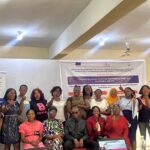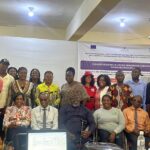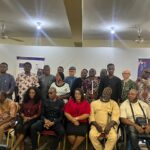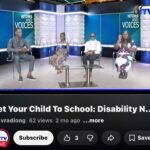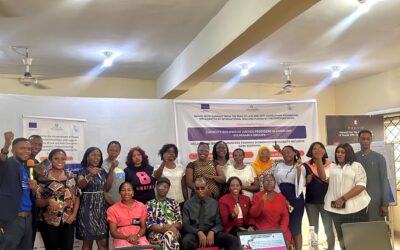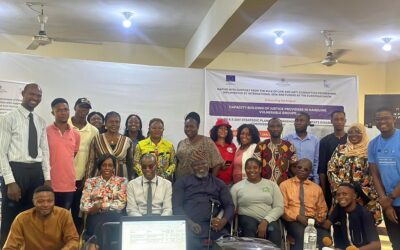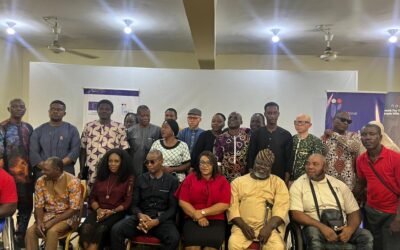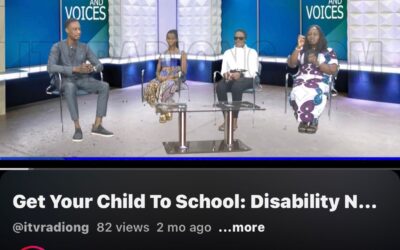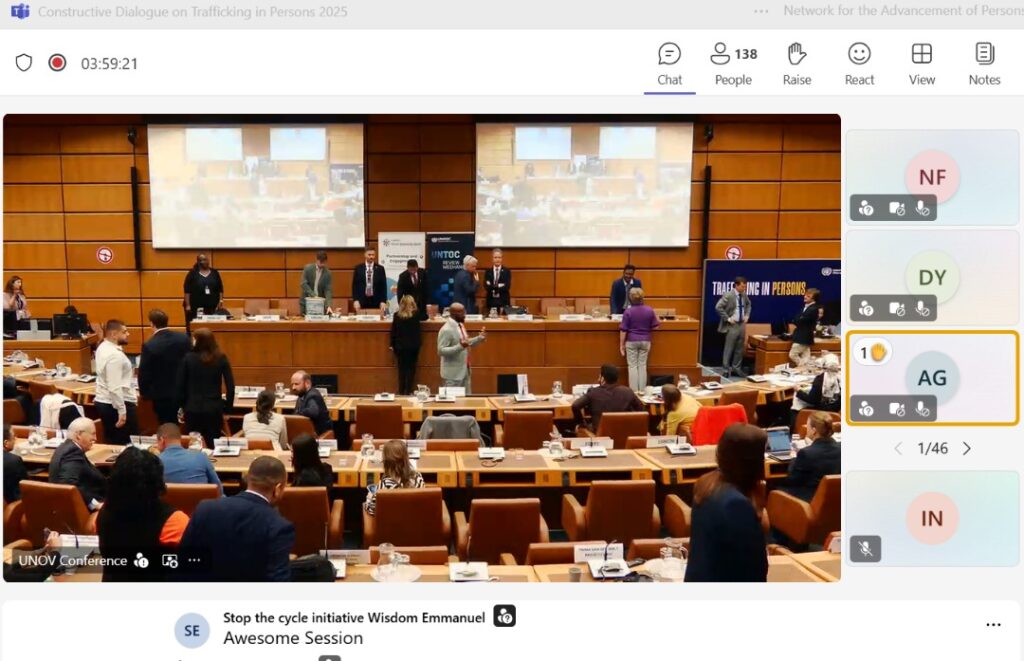
Vienna, 8 October 2025: The United Nations Office on Drugs and Crime (UNODC) convened its fourth Constructive Dialogue on Trafficking in Persons in Vienna, focusing on emerging trends such as crime networks forcing victims into online scams. UNODC’s recent global trafficking report underscores how the nature of exploitation is changing: detected cases of forced labor have surged, and trafficking for “forced criminality” – including online fraud schemes – has risen eightfold since 2016 jurist.org. In fact, UNODC noted that many criminal groups now “engage in human trafficking, luring workers…with the promise of employment, but instead hold [them] captive” to run scam operations. These trends make it urgent that anti-trafficking policies adapt. As part of civil society participation, the Network for the Advancement of People with Visible Disabilities (NAPVID) joined the dialogue virtually. NAPVID’s Executive Director, Melody Omosah Esq., used the forum to stress that persons with disabilities must not be overlooked in these evolving crime patterns.
The Network for the Advancement of People with Visible Disabilities (NAPVID) is a Nigerian NGO dedicated to promoting rehabilitation, economic justice and social inclusion for persons with disabilities. Since 2008 we have worked to ensure that people with disabilities have equal access to education, employment and public services. Drawing on this expertise, Melody Omosah presented NAPVID’s perspective to the UNODC meeting, highlighting how disability inclusion strengthens the global fight against trafficking. He emphasized that “nothing about us without us” must apply, policies only work if lived experience of disability is included in their design and implementation.
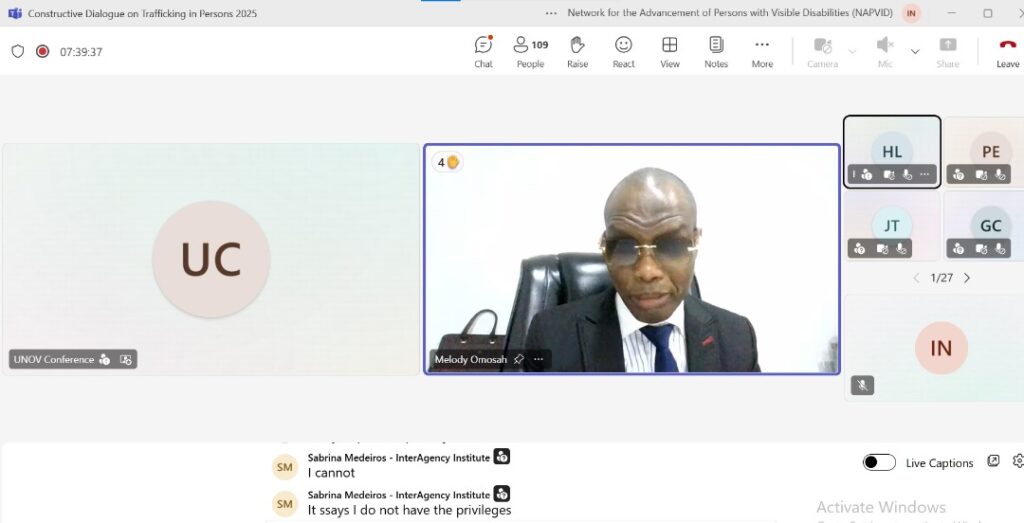
Key Recommendations from NAPVID
At the dialogue, NAPVID proposed five priority actions to make the UNTOC framework and related trafficking protocols more disability inclusive. These can be summarized as follows:
-
Explicit Recognition of Persons with Disabilities as a Vulnerable Group. We urged that the final declaration explicitly name people with disabilities among the “vulnerable groups” needing protection. Persons with disabilities face unique barriers in trafficking contexts – from social isolation to dependence on caregivers – that heighten their risk. Indeed, a U.S. Trafficking in Persons report observed that persons with disabilities are “especially vulnerable” to trafficking. Polaris Project data confirms this: between 2015 and 2017 the U.S. human trafficking hotline identified 2,116 potential victims who had a physical or mental disability immediately prior to being trafficked polarisproject.org. Naming disability explicitly in UNTOC texts will raise visibility of these victims, trigger targeted protections, and align with countries’ obligations under the Convention on the Rights of Persons with Disabilities (CRPD).
-
Disability-Disaggregated Data in Reporting. We stressed that “what is not counted is not addressed.” Countries should collect and report data on trafficking survivors by disability status. Without this, the needs of survivors with disabilities remain invisible, and governments cannot identify gaps in their systems. Disability data would reveal, for example, how many trafficking survivors require special assistance – informing plans and funding to include them.
-
Accessibility Standards in Victim Support Services. All victim assistance programs must be fully accessible. Melody pointed out that accessibility is a right, not a privilege: a deaf survivor needs sign language interpreters and accessible forms to report abuse, and a person with a mobility impairment must be able to reach a safe shelter. The U.S. National Human Trafficking Hotline has warned that adequate services go “beyond ensuring offices and shelters are ADA compliant” – they must also provide live assistance like interpreters and assistive devices. This recommendation aligns with CRPD Article 9, which requires accessible transport, buildings, and information systems, and CRPD Article 13 on equal access to justice. We urged UNODC and states to incorporate these accessibility requirements into all guidelines and support programs.
-
Dedicated Funding and Capacity-Building for DPOs. We called on donors and governments to provide direct funding and technical aid to Disabled Persons’ Organizations (DPOs) working on trafficking. DPOs and organizations of persons with disabilities (OPDs) are trusted within their communities and uniquely understand the vulnerabilities of people with disabilities. Strengthening DPOs means better outreach: they can help detect abuse early, support victims to report crimes, and ensure rehabilitation services are truly inclusive. Investing in DPO capacity thus makes prevention and assistance efforts more effective and rights-based.
-
Full Participation of OPDs in Policy Processes. NAPVID insisted that OPDs must have seats at the table in all relevant UNTOC discussions, national consultations and review processes. The motto “nothing about us without us” guided this point: policies on trafficking will only work if persons with disabilities help shape them. Inclusion of OPDs in designing national action plans, monitoring bodies and training curricula will help ensure that the strategies reflect real needs. Our representative emphasized that when OPDs participate, anti-trafficking systems become more legitimate, effective and inclusive, truly leaving no one behind.
In presenting these recommendations, Melody Omosah drew on both UN norms and ground-level evidence. Our interventions echoed calls from international human rights law that survivors have equal access to justice and protection. As Polaris notes, survivors with disabilities may face communication barriers and distrust (for example, if an interviewer is not in sign language or if family members doubt their testimony)polarisproject.org. We argued that dismantling these barriers through training, accessible procedures and DPO partnership is essential.
By the end of the dialogue, a total of 66 recommendations were recorded from all participants. NAPVID’s contributions – fully citing the CRPD framework and highlighting the “invisible” plight of disabled survivors – helped ensure disability inclusion was not overlooked. In closing, we reaffirmed that trafficking thrives on vulnerability, and persons with disabilities are among the most vulnerable. Inclusive policies make the entire system stronger and fairer. Our hope is that States Parties and UNODC will adopt these ideas so that the anti-trafficking framework truly upholds CRPD commitments and fulfills the promise to leave no one behind.
